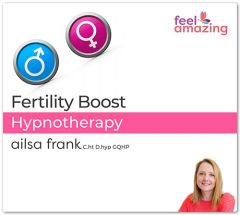Birth, Fertility & IVF Hypnotherapy
Birth, Fertility, & IVF Hypnotherapy
What role does hypnotherapy play in fertility, IVF, pregnancy, and labour?
Hypnotherapy will ease anxiety, build mental resilience, and teaches techniques to ease pain allowing you to feel more relaxed during IVF treatments, pregnancy, gynaecological pain, examinations and labour, putting you more in control. A combination of distraction techniques, deep relaxation, deep breathing, and visualisation is used to create a deep state of relaxation during labour. Listening to birth hypnosis during labour is vital for giving you maximum benefits. Some women don't like to be or feel out of control, and hypnotherapy empowers you.
Ailsa treats IVF, fertility, pregnancy wellbeing, birth hypnosis, vaginismus, endometriosis pain, uncomfortable sex issues, PTSD from sexual assault, menopause, uncomfortable periods, body dysmorphia, eating issues, anxiety, depression, postpartum depression, post-natal depression, birth trauma, episiotomy, pelvic floor strengthening, bowel prolapse, miscarriage and pregnancy loss.
Self-hypnosis techniques can be useful to learn to reduce pain and help you relax during smear tests, coil fittings or removals, for injections and during dental procedures. Hypno-pain sedation techniques reduce the need for opioids and other pain relief medication.
If you are interested in hypnotherapy phone appointments or face-to-face appointments in Harley Street, contact us or click here for prices. Alternatively, visit the shop to buy the Birth, Fertility and IVF hypnosis recordings or get my award-winning 'Feel Amazing' app now to start listening straight away. Join the thousands of people who have taken back control the Ailsa Frank way.
"Since the hypnotherapy, I now feel more prepared and in control of anxiety and worries. The sessions have been invaluable," Naomi from London
Hypnosis birth classes, one-to-one sessions, or recordings?
I have been offering fertility and birth hypnotherapy for more than ten years. Over the years, I have helped many women who are struggling to conceive, but after the hypnotherapy, they either become pregnant naturally or find it easy to get through fertility interventions which can be quite challenging and stressful. Hypnotherapy helps relax people and change their lifestyle habits which may be hampering their fertility success, such as alcohol reduction. For those who cannot succeed, hypnotherapy helps them manage expectations and find a way to successful adoption. I am a great advocate of hypnosis births as when I gave birth to my own daughter in 1992, I was incredibly impressed as I listened to a hypnosis birth recording which took the labour pains away. Although the recording I listened to was very basic, it inspired me to create my own comprehensive method covering all aspects in detail.
Alcohol, fertility, and pregnancy
As I am also a hypnotherapy alcohol reduction specialist, I have had an increase in clients seeking help to reduce their drinking in preparation for conceiving, and more recently, men worried about how drinking could be affecting their health and fertility, e.g. sperm wellbeing. I often go on to support people further through their pregnancy and birth.
Women have their children at an older age meaning more struggle to conceive easily, and this has also led to an increase in couples seeking help from me for fertility issues and support during IVF-type treatments. Often as people get into their thirties, they begin to question the volume of alcohol they drink and the effects it could be having on their health. The work I do helps bring couples to get in control of their habits and emotions to bring them closer together during the process with a combination of relaxation and positive suggestions for baby success. People find me for fertility and birth hypnotherapy as I have a clinic at the Birth Company in Harley Street in London, and I have produced a range of recordings in conjunction with them, which are available in the Women's Wellbeing section of my Feel Amazing hypnotherapy App
Hypnotherapy popularity
Hypnotherapy is generally becoming more popular as people are more aware of the power of the mind following mindful trends and social media memes promoting mind wellness. Most pregnant women have heard of hypnosis for birth so they are actively seeking help. Older mums can be worried about the birth due to their age and the graphic images they have been exposed to about birth in programmes such as One Born Every Minute, which can instil fear.
How many sessions do you need?
4 sessions (each approx 1 hour) as a general rule but extras if required. You can start hypnotherapy for pregnancy and birth as early as you like and then use recordings to reinforce and prepare up to and including on the day of the birth. If you want a top-up session in the final stages of pregnancy, this can be useful to address any last-minute things on your mind. Many women worry about the timing of starting the process of hypnosis birth, but really, the earlier, the better, and it is never too late. Even if you use recordings for the first time whilst in labour, you will still benefit.
How can we help you?
Ailsa runs one-to-one clinic hypnotherapy appointments (£400 each) in Harley Street at The Birth Company (part of the Portland Hospital, HCA Healthcare).
Alternatively, one-to-one hypnotherapy phone appointments cost £175.
Or you can access full hypnotherapy programs in the Ailsa Franks 'Feel Amazing' hypnotherapy App includes recordings to support from fertility through to birth which are made in conjunction with The Birth Company, Harley Street. An annual subscription to the Feel Amazing app is £45, or £7.99 monthly or individual titles cost £14.99.
Titles include; Enjoyable Birth Hypnosis, Fertility Boost, Positive IVF Journey, Dealing with Pregnancy Loss, Comfortable Sex for Women, Amazing Menopause, and Comfortable Periods.
How does hypnotherapy work?
Hypnosis is an altered state of awareness, or daydream state, where you become highly responsive to suggestions. A hypnotherapist uses these techniques to take to a client into a relaxed feeling to be then able to make deep changes in the subconscious part of the mind, which stores memories and learnt behaviour. This allows you to make a fast change by unlocking the root of bad habits, fears and beliefs whilst embedding positive suggestions for future success in the deeper part of the mind whilst the conscious critical mind is at rest.
Where did it come from?
Hypnosis goes back thousands of years.
Sleep temples (also known as dream temples or Egyptian sleep temples) are regarded by some as an early instance of hypnosis over 4000 years ago. The Greeks adopted Sleep temples too. Hypnos the Greek God of sleep.
Hypnotherapy has been commonly used since the 1800s. French psychologist Emile Coue (1857-1926) introduced psychotherapy and self-improvement positive autosuggestion used in self-hypnosis. Sigmund Freud (1856-1939) used hypnotherapy in his early work but later rejected it in favour of Psycho-analytic theory. It has been used for pain relief since the 1940s as an anaesthetic in operations, and the work of Milton Erikson (1901-1980), known as Eriksonian hypnosis, became popular from the mid-20th century and now widely used for treating anxiety, addictions, pain management, stress, sleep and confidence. Hypnosurgery sedation since the 1840s, James Braid, was a pioneer of the method.
When did hypnosis for birth begin?
The phrase 'natural birth', which refers to the absence of interventions, is a term that originates from the English obstetrician Grantly Dick-Read's first book, Natural Childbirth, published in 1933. His second book in 1942, called, Childbirth without fear, became an international best seller. In the 1980s, Michelle Leclaire O'Neill, a follower of Dick-reads research, wrote "Hypnobirthing the Original Method". Marie Mongan was another follower of Dick-Read methods, which she used successfully during her own labour. Founded the hypnobirthing Institute. Known as the Mongan method. 'Hypnobirthing' is a registered trademark.













Validate your login
Log In
Create New Account